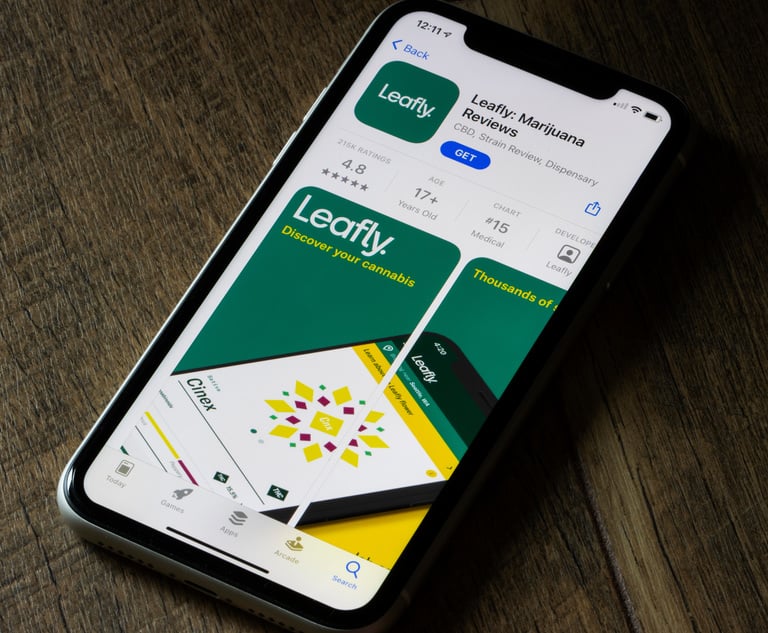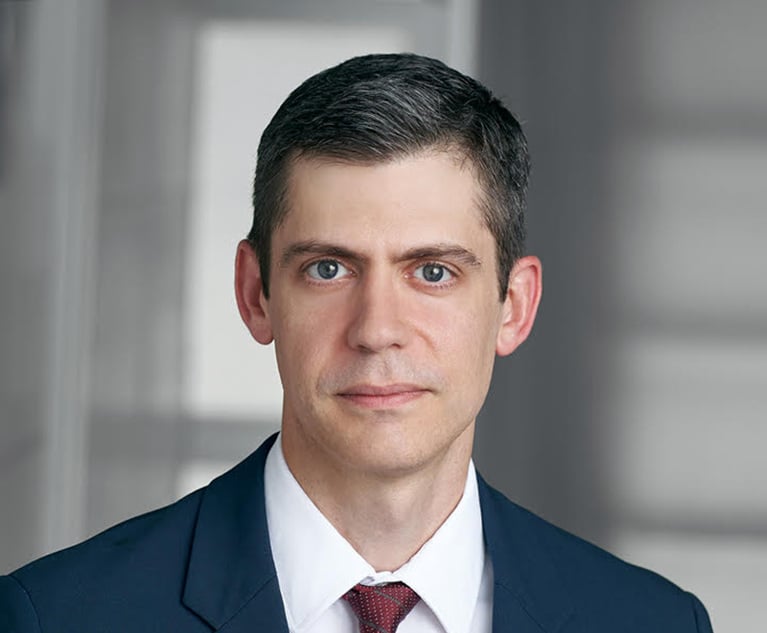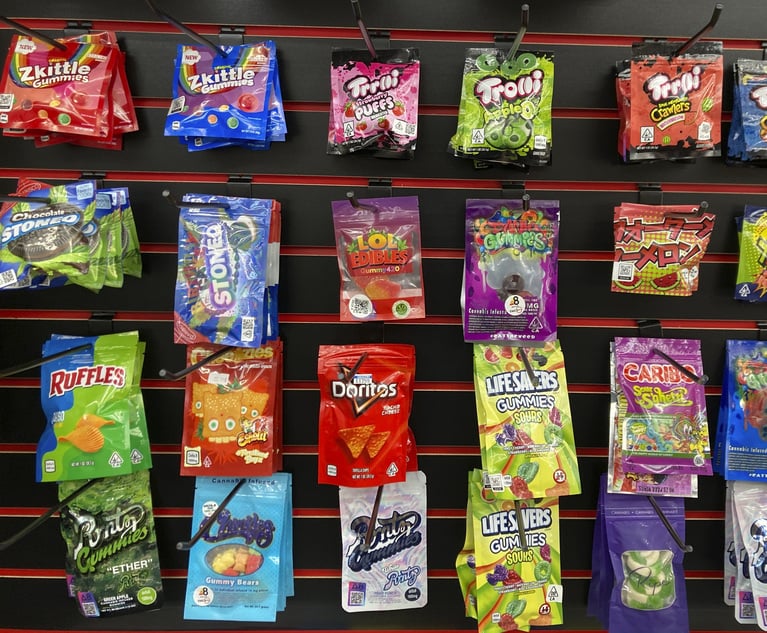Higher Law: See the New Workplace Weed Ruling? | Meet Terra Tech's GC | Plus: Who Got the Work
There's a big new workplace cannabis ruling out of New Jersey that is generating some discussion. And meet Terra Tech's general counsel. Plus: Florida litigation developments, new client engagements and a lot more. This is Higher Law.
August 16, 2018 at 04:00 PM
8 minute read
Welcome back to Higher Law, our weekly briefing on all things cannabis. I'm Cheryl Miller, reporting for Law.com from Sacramento, where my mind is on the late, great Aretha Franklin.
I don't know what the Detroit resident thought about her home state's pending marijuana initiative or if she even had views on legalization. I do know that Higher Law is best enjoyed with Chain of Fools playing on loop in the background. Respect, Queen of Soul.
This week we take a look at another workplace weed ruling, this one in New Jersey. Terra Tech's general counsel talks about being the chief legal officer for a cannabis company. And scroll down to see who got the work.
Thanks as always for reading. Got a story idea or tip? Thoughts on Higher Law? Drop me a line at [email protected] or call 916-448-2935. Follow me on Twitter at @capitalaccounts.
➤➤ Would you like to receive Higher Law as an email? Click here.
DLA Piper Notches Win Against Workplace Weed
A federal judge in New Jersey has jumped into the contentious debate over weed in the workplace. In an August 10 unpublished opinion, U.S. District Judge Robert Kugler wrote that New Jersey's medical marijuana law doesn't require employers to waive a drug test for workers who are cannabis cardholders.
The case stems from a disability discrimination lawsuit filed by Daniel Cotto Jr. After Cotto hit his head on a forklift, his employer, Ardagh Glass Packing Inc., asked him to take a drug test. Cotto said he couldn't pass the test because he takes several prescribed drugs, including marijuana. Cotto was placed on indefinite suspension, and he sued.
DLA Piper LLP's Paul Erian represented Ardagh Glass in the case. Read the firm's motion to dismiss here. “Where state law goes further and affirmatively requires that an employer accommodate an employee's illegal possession and use of marijuana, the state law conflicts with federal law and is preempted,” Erian wrote.
Kugler noted that courts in California, Colorado, Michigan, New Mexico and Washington state have all held that medical marijuana legalization laws do not shield workers from adverse employment actions.
I asked Adam Gersh, an attorney in Flaster Greenberg's labor and employment practice in Cherry Hill, whether the ruling would change his advice to employers. In short, he said, no.
“I think it reaffirms that, as of now, employers continue to have the right to test for and discipline employees for using medical marijuana, even when there is no evidence of impairment at work,” he told me.
Should employers drug test employees? Should they allow qualified employees to use marijuana outside the workplace?
That depends on the business, Gersh says.
“I continue to advise that employers need to carefully consider the consequences of their policies and tailor their policies to their workplace,” he said.
More reading… Attorneys from Ballard Spahr, Saul Ewing and FisherBroyles also weighed in what the ruling does and doesn't mean.
➤➤ Terra Tech's Top Legal Gun
So what's it like leaping from a traditional law firm into the role of top lawyer at a cannabis company. My colleague Caroline Spiezio recently spoke with Joseph Segilia, general counsel at Irvine, California-based Terra Tech Corp., to find out.
Segilia, who joined Terra Tech in 2016, just as California voters approved recreational marijuana, said he faced a steep learning curve as the state introduced and re-introduced hundreds of pages of proposed regulations.
“People who have been doing this in California for years more than me were very familiar with those,” Segilia said. “Some people were involved in lobbying them, drafting them. I had never read one before.”
Asked about the deal market, Segilia said valuations are very high, and he's watching the active market in Canada.
“But I've been surprised by the lack of M&A activity,” he said. “I don't know why that is. Maybe because cannabis is still Schedule 1?”
Terra Tech recently announced second quarter revenues of $8.7 million, up 11 percent over the same time period last year.
➤➤ Who Got the Work…
• The state of Florida has spent at least $1.9 million on private legal services to defend its medical marijuana regulations and related enforcement policies, according to Florida Politics. Most of that money has gone to the Tallahassee firm of Vezina, Lawrence & Piscitelli. The eight-office firm of Shutts & Bowen, which has a contract worth up to $300,000, also defended the state against a lawsuit brought by medical marijuana patient Joe Redner, who wants to grow his own cannabis.
• The Marijuana Policy Project has hired Steve Hawkins, most recently president of the criminal justice reform group Coalition for Public Safety, as its new executive director. Hawkins, who earned his J.D. at New York University School of Law, has previously served in executive roles at Amnesty International USA and the NAACP. The Marijuana Policy Project bills itself as the largest U.S. organization focused solely on ending marijuana prohibition.
• U.S. Hemp Roundtable has retained Sacramento lobbying and political law firm Nielsen Merksamer Parrinello Gross & Leoni. The California Department of Health recently issued guidance that state retailers cannot sell food or dietary supplements containing hemp-derived CBD. In a statement issued last month, U.S. Hemp Roundtable said it would be “petitioning state political leaders to interpret the law appropriately, or to pass new laws that clarify that the retail sale of hemp-derived CBD is permissible.”
➤➤ In the Weeds
>> Florida's AG backs the legislature's ban on smoking marijuana. State AG Pam Bondi (above) filed a brief in the First District Court of Appeal, which is hearing the state's challenge to a May ruling by Leon County Circuit Judge Karen Gievers that overturned the smoking ban. “The Legislature reasonably determined that the harms caused by smoking—including harms to patients and those exposed to secondhand smoke—were ample reason to exclude smoking from the statutory definition of 'medical use,” Bondi wrote. [Tampa Bay Times]
> United Cannabis Corp's GC says the company's CBD patent claims are “novel and inventive.” Last week we wrote about United Cannabis' lawsuit, filed in federal district court in Colorado, which alleges Pure Hemp Collective infringed on its patent for certain liquid CBD formulations. This week United Cannabis general counsel Jesús Vázquez responded to criticism that the company's '911 patent claims are too broad. “I believe all thirty-six claims of the '911 patent are valid and enforceable, as did the patent examiner who issued the patent,” Vázquez wrote. [IPWatchdog]
> Speaking of United Cannabis Corp., the Colorado company was sued in a California state court this week. H2 Partners of Moorpark, California, alleges United Cannabis oversold its ability to grow a hemp crop for CBD production. It's a tale of letters of intent, a hailstorm, agreements / non-agreements and an arbitration clause. H2 Partners is seeking more than $16 million in damages. [The Recorder]
> A new lawsuit says Utah's medical marijuana initiative violates Mormons' rights. Plaintiff Walter Lamb, an attorney and member of the Church of Jesus Christ of Latter-day Saints, argues that a provision barring property owners from not renting to tenants because they hold medical marijuana cards, would violate his religious beliefs. Lamb wants the measure removed from the November ballot. [The Salt Lake Tribune]
> The pot practice is coming out of the shadows. Sure, some Big Law firms are still wary of handling marijuana clients. But others are openly welcoming state-legal businesses seeking help with IP, real estate and investors. “It's almost the same reason why a lot of states are getting into the cannabis space,” Joshua Horn, co-chair of Fox Rothschild's cannabis practice co-chair told Bloomberg. “You can only raise revenue so many ways.” [Bloomberg]
> California cities don't want unrestricted marijuana deliveries. The League of California Cities this week came out against proposed final regulations that would allow licensed marijuana deliveries anywhere in the state, even in jurisdictions that ban grows, manufacturing and deliveries. This isn't a big surprise. Cities bitterly fought a now-defunct bill that would have done the same thing. The question is, can they do anything to stop the new rule from going into effect? [Los Angeles Times]
➤➤ All the Things on the Calendar
Aug. 20: California's Cannabis Advisory Committee meets in Sacramento.
Aug. 23: The Cannabis Law Institute hosts a free webinar for members, “Trade Secrets in the Cannabis Industry.” Scheduled speakers are Tom Zuber of Zuber Lawler & Del Duca and Megan Rimovsky, director of IP at Cannabistry Labs.
Aug. 23: The Massachusetts Cannabis Control Commission meets and may vote on licensing testing labs.
This content has been archived. It is available through our partners, LexisNexis® and Bloomberg Law.
To view this content, please continue to their sites.
Not a Lexis Subscriber?
Subscribe Now
Not a Bloomberg Law Subscriber?
Subscribe Now
NOT FOR REPRINT
© 2025 ALM Global, LLC, All Rights Reserved. Request academic re-use from www.copyright.com. All other uses, submit a request to [email protected]. For more information visit Asset & Logo Licensing.
You Might Like
View All
NY Cannabis Marketing Rulings / Rescheduling Effects / Honigman's Work on Trademark Suit / Goodbye
9 minute read
Workplace Weed and Labor Pacts / State AGs and Hemp / Maryland Licensing Suit / Vicente Sues Recruiter
9 minute readTrending Stories
- 1Supreme Court Takes Up Challenge to ACA Task Force
- 2'Tragedy of Unspeakable Proportions:' Could Edison, DWP, Face Lawsuits Over LA Wildfires?
- 3Meta Pulls Plug on DEI Programs
- 4On the Move and After Hours: Meyner and Landis; Cooper Levenson; Ogletree Deakins; Saiber
- 5State Budget Proposal Includes More Money for Courts—for Now
Who Got The Work
Michael G. Bongiorno, Andrew Scott Dulberg and Elizabeth E. Driscoll from Wilmer Cutler Pickering Hale and Dorr have stepped in to represent Symbotic Inc., an A.I.-enabled technology platform that focuses on increasing supply chain efficiency, and other defendants in a pending shareholder derivative lawsuit. The case, filed Oct. 2 in Massachusetts District Court by the Brown Law Firm on behalf of Stephen Austen, accuses certain officers and directors of misleading investors in regard to Symbotic's potential for margin growth by failing to disclose that the company was not equipped to timely deploy its systems or manage expenses through project delays. The case, assigned to U.S. District Judge Nathaniel M. Gorton, is 1:24-cv-12522, Austen v. Cohen et al.
Who Got The Work
Edmund Polubinski and Marie Killmond of Davis Polk & Wardwell have entered appearances for data platform software development company MongoDB and other defendants in a pending shareholder derivative lawsuit. The action, filed Oct. 7 in New York Southern District Court by the Brown Law Firm, accuses the company's directors and/or officers of falsely expressing confidence in the company’s restructuring of its sales incentive plan and downplaying the severity of decreases in its upfront commitments. The case is 1:24-cv-07594, Roy v. Ittycheria et al.
Who Got The Work
Amy O. Bruchs and Kurt F. Ellison of Michael Best & Friedrich have entered appearances for Epic Systems Corp. in a pending employment discrimination lawsuit. The suit was filed Sept. 7 in Wisconsin Western District Court by Levine Eisberner LLC and Siri & Glimstad on behalf of a project manager who claims that he was wrongfully terminated after applying for a religious exemption to the defendant's COVID-19 vaccine mandate. The case, assigned to U.S. Magistrate Judge Anita Marie Boor, is 3:24-cv-00630, Secker, Nathan v. Epic Systems Corporation.
Who Got The Work
David X. Sullivan, Thomas J. Finn and Gregory A. Hall from McCarter & English have entered appearances for Sunrun Installation Services in a pending civil rights lawsuit. The complaint was filed Sept. 4 in Connecticut District Court by attorney Robert M. Berke on behalf of former employee George Edward Steins, who was arrested and charged with employing an unregistered home improvement salesperson. The complaint alleges that had Sunrun informed the Connecticut Department of Consumer Protection that the plaintiff's employment had ended in 2017 and that he no longer held Sunrun's home improvement contractor license, he would not have been hit with charges, which were dismissed in May 2024. The case, assigned to U.S. District Judge Jeffrey A. Meyer, is 3:24-cv-01423, Steins v. Sunrun, Inc. et al.
Who Got The Work
Greenberg Traurig shareholder Joshua L. Raskin has entered an appearance for boohoo.com UK Ltd. in a pending patent infringement lawsuit. The suit, filed Sept. 3 in Texas Eastern District Court by Rozier Hardt McDonough on behalf of Alto Dynamics, asserts five patents related to an online shopping platform. The case, assigned to U.S. District Judge Rodney Gilstrap, is 2:24-cv-00719, Alto Dynamics, LLC v. boohoo.com UK Limited.
Featured Firms
Law Offices of Gary Martin Hays & Associates, P.C.
(470) 294-1674
Law Offices of Mark E. Salomone
(857) 444-6468
Smith & Hassler
(713) 739-1250













